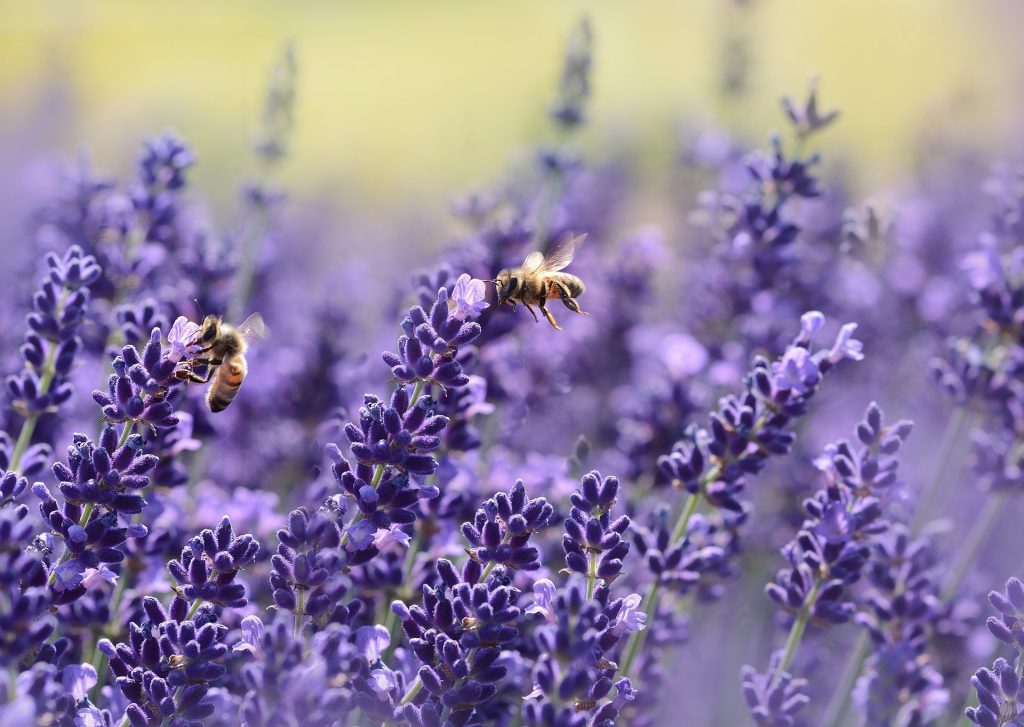 Lavender (Lavandula angustifolia) is a shrub that grows to about 3 ft in height. The plants are native to the Mediterranean region and have traditionally been used for their fragrance in perfumery. The Romans used lavender for its scent, and it is often found in creams, ointments and infusions. However, lavender also has a number of medicinal properties that make it useful in the treatment of anxiety. Although the whole plant is aromatic, the flowering tops are particularly so. Evidence suggests that the volatile oils in lavender which are collected from the fresh purple flowering tops, are able to have mild anxiolytic effects in humans. Lavender may be particularly useful in the treatment of headaches that are caused by tension and stress, and this may relate to its mild antispasmodic and sedative properties. The relaxing properties of lavender come from its essential oil, which contains a number of active ingredients including linalool, linalyl acetate, β-caryophyllene, lavandulyl acetate, (Z)-β-ocimene and terpene-4-ol.
Lavender (Lavandula angustifolia) is a shrub that grows to about 3 ft in height. The plants are native to the Mediterranean region and have traditionally been used for their fragrance in perfumery. The Romans used lavender for its scent, and it is often found in creams, ointments and infusions. However, lavender also has a number of medicinal properties that make it useful in the treatment of anxiety. Although the whole plant is aromatic, the flowering tops are particularly so. Evidence suggests that the volatile oils in lavender which are collected from the fresh purple flowering tops, are able to have mild anxiolytic effects in humans. Lavender may be particularly useful in the treatment of headaches that are caused by tension and stress, and this may relate to its mild antispasmodic and sedative properties. The relaxing properties of lavender come from its essential oil, which contains a number of active ingredients including linalool, linalyl acetate, β-caryophyllene, lavandulyl acetate, (Z)-β-ocimene and terpene-4-ol.

Lavender is known for its relaxing and calming effects in humans. Clinical trials show that aromatherapy involving the use of essential oils including lavender is effective at reducing agitation in patients with dementia. Use of lavender in aromatherapy has also been shown to reduce anxiety and or depression in a number of different trials involving human patients in intensive care, undergoing dental procedures or in patients with cancer. Evidence suggests that smelling the essential oil of lavender is able to cause significant reductions in the presence of the stress hormones cortisol in saliva. In addition, smelling lavender may also increase the antioxidant capacity of the the saliva. This suggests that the calming effect from lavender may result from alteration in stress hormones and changes in antioxidant status, which may protect the body from free radical damage. Animal studies also suggest that lavender may have anxiolytic effects. For example, in one study lavender odour inhalation in gerbils was as effective as the benzodiazepine drug diazepam, at reducing the anxious behaviour in the animals following stress induced through a maze test. In another study, lavender essential oil was shown to have some of the same anxiolytic effects as the antianxiety benzodiazepine drug chlordiazepoxide in rats. In another experiment human subjects exposed to lavender essential oil during a maths test had significant reductions in chromogranin A levels compared to control subjects. As chromogranin A may indicate a detrimental stress induced activation of the immune and endocrine systems, these results suggest that lavender may have beneficial modulatory effects pertaining to reductions in stress levels. Lavender may work through an effect on the central nervous system. Some evidence suggests that it might affect the GABA system in a similar way to benzodiazepine drugs. However, the mechanism of the anxiolytic effects of lavender are not well characterised.
A tincture of Lavandula angustifolia has been compared to the tricyclic antidepressant drug imipramine for the treatment of mild to moderate depression. In this 4 week double blind randomised controlled trial, outpatients with depression were administered either 60 drops of lavandula tincture (1:5 in 50 % alcohol), 100 mg per day imipramine, or 100 mg imipramine plus 60 drops of lavandula tincture per day. The results showed that imipramine was more effective than lavender tincture in the treatment of mild to moderate depression in the subjects. Both treatments were significantly effective at reducing the depressive symptoms in the subjects. However, when lavender was taken with imipramine, the reduction in depression was significantly better than imipramine on its own, suggesting the lavender had synergistic effects with the antidepressant. There were also side effects from imipramine that were not present in the lavender including the dry mouth and urinary retention.
Eat Well, Stay Healthy, Protect Yourself
RdB
